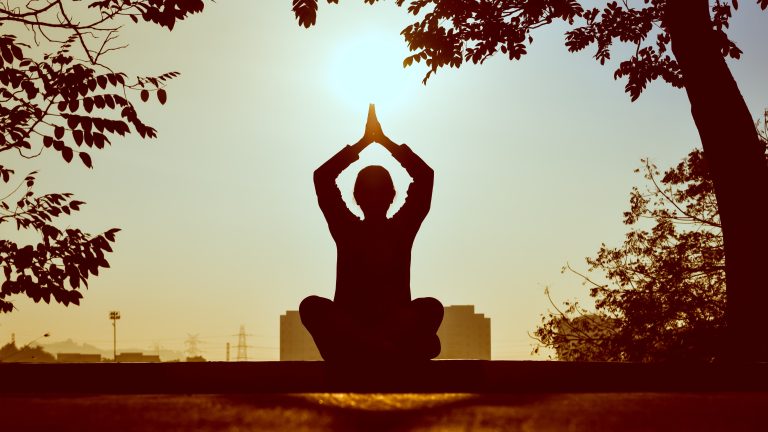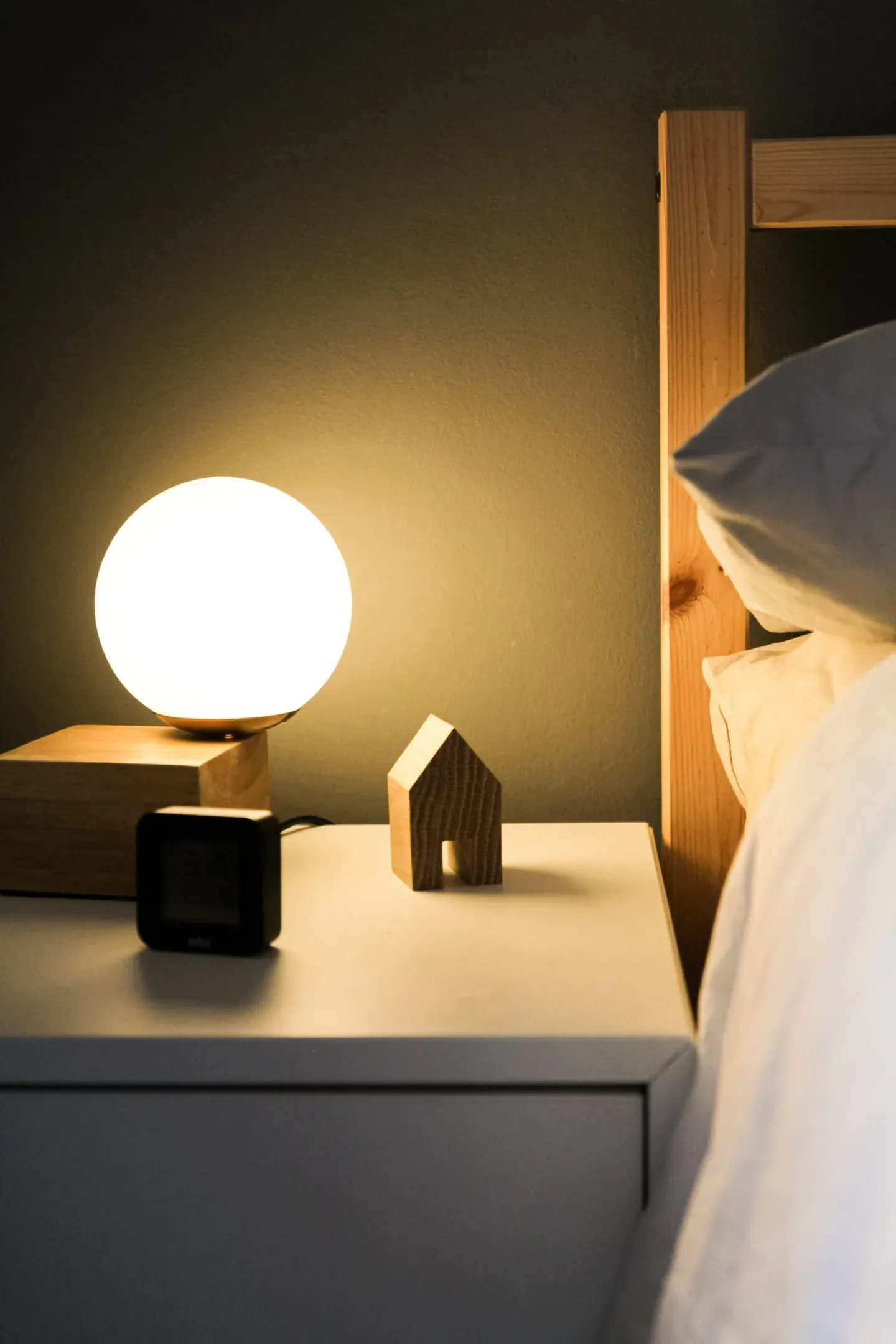Have trouble falling asleep at night? You’re not alone. A study shows that 35% to 50% of the global adult population exhibits insomnia symptoms. Truthfully, we are not surprised. We live in an ever-restless world constantly surrounded by distractions, digital screens and a hectic lifestyle……sleep deprivation is expected! When an average adult consistently experiences less than 7 hours of sleep per night, they are likely to have insomnia along with the various detrimental health effects it brings forth: obesity, memory loss, diabetes, heart disease, depression, and more.
So, how can one sleep better? Believe it or not, meditation for sleep is the answer.
What is Sleep Meditation?
Quite often, sleep problems arise from stress, anxiety and tension. When the day’s worries begin to cloud your mind at night, getting good sleep can be a struggle. Meditation helps enhance inner peace while quieting the body and mind. It helps produce a sense of overall calmness leading to a night of soothing, peaceful sleep.
In short, meditation for sleep is a guided experience that helps relax the mind so your body can get the rest it needs.
Download the app today!
Benefits of Sleep Meditation
So far, we have learnt that getting good quality sleep is a wonderful benefit of meditation. But is it the only one? Read further to find out how sleep meditation can benefit you in other ways.
-
Reduces Stress
Several studies continue to show how regular meditation helps reduce stress. Meditating before sleep helps your brain waves release emotional tension, slow down your nervous system and allow your muscles to relax. It triggers a relaxation response reducing the stress in your body and mind.
-
Manages Anxiety
Meditation is also a great way to manage anxiety. Sleep meditation for anxiety, such as mindfulness meditation, has shown how it helps to reduce anxiety symptoms in people with Generalized Anxiety Disorder (GAD). It helps to relax, increase your focus and improve your overall health.
-
Enhances Memory
A study by Harvard shows that better sleep quality can also help improve mental clarity, memory and cognitive performance. It also leads to enhanced attention and the ability to perform tasks more efficiently.
-
Physiological Benefits
In addition to emotional health benefits, meditation affects the body too. It impacts hormones and brain chemistry in ways that positively boost physical health and make sleeping easier. Reduced blood pressure, improved heart health and enhanced melatonin and serotonin levels are a few of the many physiological benefits of sleep meditation.
-
Brings About Habitual Changes
By practising meditation before bedtime, you can work towards replacing bad habits like late-night drinking and using the phone before bed with positive changes such as meditation for sleep. It can help improve your sleep quality too, because at the end of the day, how well you sleep is as important as how long you sleep.
Types of Sleep Meditation
-
Mindfulness Meditation
A popular form of meditation, mindfulness involves focusing on the present while paying attention to your thoughts, feelings and actions. Notice any thoughts or emotions? Simply observe them and let them pass without judging yourself.
-
Body Scan Meditation
As the name suggests, body scan meditation involves performing a slow mental scan of your entire body. As you do so, you become increasingly aware of your physical sensations (including all tensions and pain) and focus on each part of your body, one at a time.
-
Guided meditation
Typically involving another person (through a video, app or podcast), guided meditation takes you through the meditation process by guiding you each step of the way. You may repeat a mantra, count, focus on your breathing, visualise imagery or even listen to soft and soothing YouTube meditation music for sleep that will help you fall asleep. Yes, music has the power to transport you to another time and place – one full of bliss and pure relaxation.

Meet your Happiness Goals on Happily
Our Relevant Products
Feel Calm
Feel Motivated
Mindful Relationships
Personal Growth
Brtter Sleep
Slowing Down
and many more...
Yoga Nidra
A form of guided meditation and regarded as one of the best meditations for sleep, Yog (or yoga) Nidra is a meditation practice as old as yoga itself. It means yogic or psychic sleep and involves inducing a state of consciousness between waking and sleeping. Yoga Nidra has gained popularity in recent times among the youth as well as meditation enthusiasts outside India.
Practiced by lying down and being guided by an instructor/teacher, the technique draws attention inwards as the student turns their attention slowly and seamlessly into the very nature of awareness and consciousness. The practice makes one feel interconnectedly whole, expansive yet restful. The final phase leads to exploring consciousness on a deeper level.
How To Do Meditation For Sleep
Confused by the above meditation methods and unsure which would work best for you? Worry not. Follow these six steps to a simple meditation technique that will help aid sleep.
- Choose a quiet place, ideally your bed. Keep your phone away and on silent.
- Start by lying down and allowing your legs to be relaxed hip-width apart. Your arms can be by your side or on your belly.
- Notice your breath. Pay close attention to your breathing: the rise and fall of your chest and the air moving in and out of your mouth and nose.
- Let your thoughts flow. It’s normal to think about everything that happened in the day or be worried about tomorrow. That’s perfectly all right. Acknowledge those thoughts, let them be and come back to your breathing. In and out…
- Do a mental body scan. You don’t need to move your body but only notice the physical sensations. Start from your toes and move up through the body. Assess and be aware of how each part of your body feels. Notice any stress and tension? Relax your muscles, release the pressure and just let go…
- Continue to focus on your breaths. Slowly, start counting your breaths. As your chest rises and falls and you feel the breath enter and leave the body, count your breaths up to 10. If your mind chooses to wander, let it go. Just return your attention to your breathing when you notice a distraction.
While the above meditation can help improve sleep, it’s also encouraged to follow a soothing unwind routine for a good night’s sleep. Follow a regular sleep schedule, avoid devices an hour before bed, do some journaling, and keep your room dim and quiet – these can make a huge difference!
Stress and an overactive mind may stand in the way of getting good quality sleep. If you’re someone who has trouble falling asleep, sleep meditation can be a game changer.
Interested in improving your sleep quality? Learn more about sleep meditation in our blog here.
Remember, you don’t need to meditate for hours on end – just 20 minutes of meditation each day is enough to improve your quality of life.






